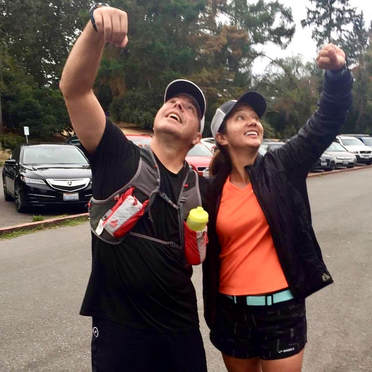The Freedom As GPS technology has gotten better, the ability of GPS watches to track overall distance and pace over a variety of terrain has correspondingly gotten more precise. If you have a five mile run scheduled, it’s satisfying to know that you can just go out your door and wander around for five miles. Done! Even on trails, we’ve seen that GPS has gotten better at measuring the course. This freedom to wander really adds an element of fun! The Trap Even a GPS watch can have issues. If you are on a course that has a lot of turns like on a track or on trails, the GPS can either overestimate or underestimate distance which can cause the pace tracking abilities of the watch to be wildly inaccurate. And if you’ve ever used an app on your phone to track mileage, you may find that distance or pace on those devices is completely different and inaccurate. And let’s not forget that in some instances, your watch just will not track satellite information correctly. Tall buildings, lots of overpasses, mountains and tunnels can all interfere with your GPS and give inaccurate pacing information. Any of these scenarios can happen in a race. If you have not had a chance to develop a feel for running paces and effort at a given pace, what do you do? In my years of coaching I have seen first hand what athletes may do when their watches are not reading correctly and the reactions have been both good and bad. The Panicked Runner I have had a runner who was new to running start her goal event and due to all the buildings around her, the watch was not reading correctly, but she did not realize this. She panicked around mile 3 and really started to push harder to get her pace back on track. In doing this suddenly she was working much harder and above the ability that was sustainable and she ended up dropping ¾ of the way through the race as she was spent. The Tunnel Runner In a different scenario, I have had an experienced runner who was running the tunnel marathon. She had been warned that GPS watches don’t register for the first two miles of the tunnel marathon and therefore, we had talked through ideas for what she should do. Because she expected this, we had had her practice running very easily for pace with her watch and understand what her breathing and body would feel like keeping in mind that on race day, she would be amped up with excitement and nerves. She practiced race pace start in a couple of shorter races to get a feel for appropriate race start pace even when excited. So on race day she was able to monitor her breathing and heart rate to make sure she kept the first miles of this marathon very easy (and slower than her overall goal race pace). Once out of the tunnel her watch picked back up and she was able to continue on to have a great race. The New Trail Runner I have had a lot of athletes who are fast road runners but have no experience on trails and have learned the hard way that running and particularly racing on trails are a different game. In a race, they have gone out too hard expecting the pace to be similar or just a little slower than road pace. They chose to run by pace rather than monitoring effort and ignored the signs that their effort is too high, too soon. They push too hard on both the ups and downs. With the terrain challenges and unsustainable high effort, they struggle to finish the race and have been very beat up by the end. DependenceDo you find that you have to look at your watch and pace frequently or even constantly during a run? How many times do you let your watch dictate what you are doing? Many runners blindly follow the numbers on the screen to dictate pace and forget to monitor their bodies and are unable to run by feel. Do you push to hit a certain pace no matter how you feel? What about days you are tired, stressed or just are not feeling great? Who decides how you should run those days? If you have an easy recovery run, are you constantly checking pace to make sure it’s not too slow? On a recovery run is there really a “too slow”? If you are worrying and pushing pace, you are letting your watch dictate the pace rather than checking in with your body on that day and letting your body dictate pace. This is a great way to lead to burnout and injury. The Hamster How many of us have our favorite loops that we run over and over? Almost all of us. As runners we like to know that we are making progress. We like to know how many miles we are running and we like to see the progress of getting faster and going longer. So if one day, you run a particular course at a certain time, it’s gratifying and human nature to go out and run that same course just a little faster. Your GPS watch lets you do this. Then the next time we want to run it faster again. Just like a hamster in a wheel, we keep spinning. The problem is trying to do this every day and on every run. Fitness is not a linear thing; there are ups and downs. To really become the best athlete you can be, you have to remember that there is a purpose to running some things faster and some slower. The challenge is to remember what the purpose of a particular run is and make sure you are in charge of your run, effort and pace, not your watch. Where Does Your Mind Go?We know many runners who let their GPS watch dictate how they feel on any given day. I am sure at times we have all given more power to our watch then we should. How many of you do this? You’ve had a stressful day. You are tired, the weather is awful and you just can’t hit your goal pace on a given workout, so what do you do? Do you feel terrible the rest of the day because of how slow you were according to your watch? Do you sometimes try to run harder tomorrow to “make up for it”? Do you beat yourself up mentally or physically because you could not do something? Instead, consider going into any run or workout ready to be honest with yourself. Check in with how you are feeling as you get started and be okay with sometimes adjusting the pace or effort or even distance of a workout accordingly. This doesn’t mean bailing on a workout, always skipping a hard workout, or changing every workout, but instead it means learning and acknowledging that sometimes it’s better to adjust a workout to fit what you can do that day. Finding the appropriate pace and effort on a particular day as well as acknowledging things going on in life and where you are in training may help you listen to your body better and not mentally beat yourself up. Your “top moderate” may be a different pace one day to the next depending on your fatigue levels, where you are in training and even the course and that is okay. Learning to understand your effort and how your body feels will serve you well in training and on the day of an event and often will help you make smarter choices when it really counts. If you find you are always unable to hit the pace or effort or if you are struggling to really understand this concept, it is a great time to talk to the coach. The point of training is to stress your systems just enough to make you stronger. If you are beating yourself up in mind or body because of a number on your watch you are letting the watch rule your training. We know for a fact that ignoring what our bodies are telling us almost always will lead to injury and burnout. Tips for Running with your GPS WatchUse your GPS watch wisely. Your GPS watch is a tool that can give you other feedback besides how you are feeling, how you are breathing and your mental effort at a given pace. All of these are important for developing a better feel for pace and effort. Be deliberate and check in frequently with your body and how that matches pace or heart rate.
A GPS watch is a great tool for helping keep your easy runs easy (or slowing you down for the first miles at a marathon or Ironman) and for pushing you out of your comfort zone during a planned workout. Don't let your watch run you! Use Average Lap Pace rather than pace (or instant pace). Pace is an option on watches but it’s a notorious fickle thing which seems to surge and slow randomly. A much more useful option on the watches is “Average Lap Pace” which gives a much smoother read on your pace over a set distance (usually a mile). Play guess your pace. After you’ve run a couple miles to warm up, don’t look at your watch and try and guess what pace you are running. Check to see if what you guessed matches what your mile lap shows. Note when you are off. If you guess that you are faster than your watch shows, check in and see if maybe you are a little tired, for instance. As you get more practiced, you’ll get better at this! Program a screen which only shows time or elevation. Honestly, it doesn’t matter what it shows. Use this screen when you just can’t help but sneak at a peek at your watch to see what pace you are running (and possibly speed up..) Turn off lap notification if you find you must check your pace for every lap/mile split. Try running for time rather than for a particular distance for your easy/general aerobic runs. And program a screen which just shows elapsed time. Thus if you are scheduled to run 4 miles and that would normally take your 44 minutes, go out and run 40 - 50 minutes. Run and pay attention to effort and breathing to keep your run easy and be ok with whatever distance you end up with. A quarter of a mile over? A half a mile under? Either won’t matter in a progressive training plan. On some runs, leave your watch at home. That’s right. Just run and remember why you enjoy it!
0 Comments
Leave a Reply. |
Categories
All
Archives
|


 RSS Feed
RSS Feed
